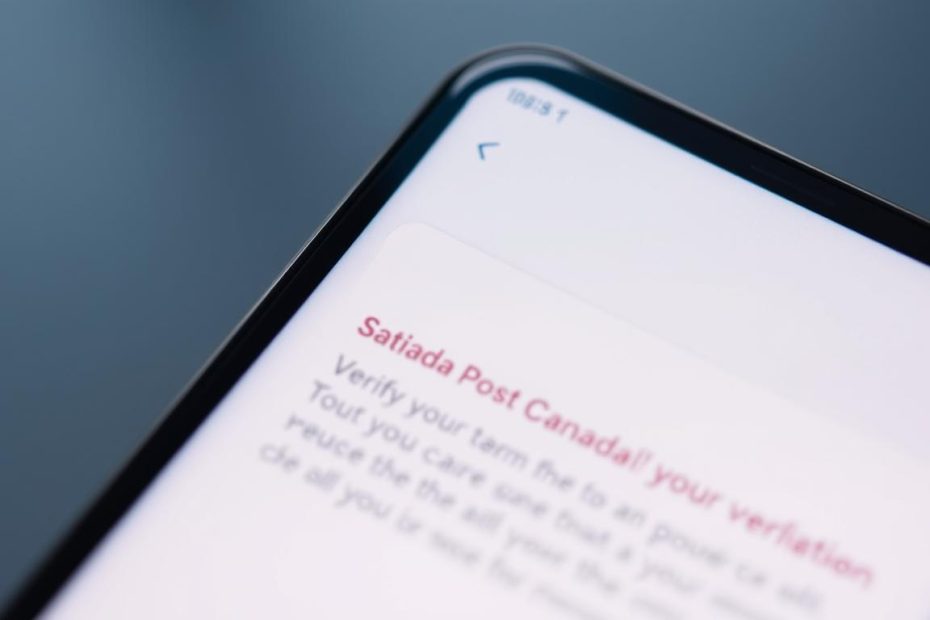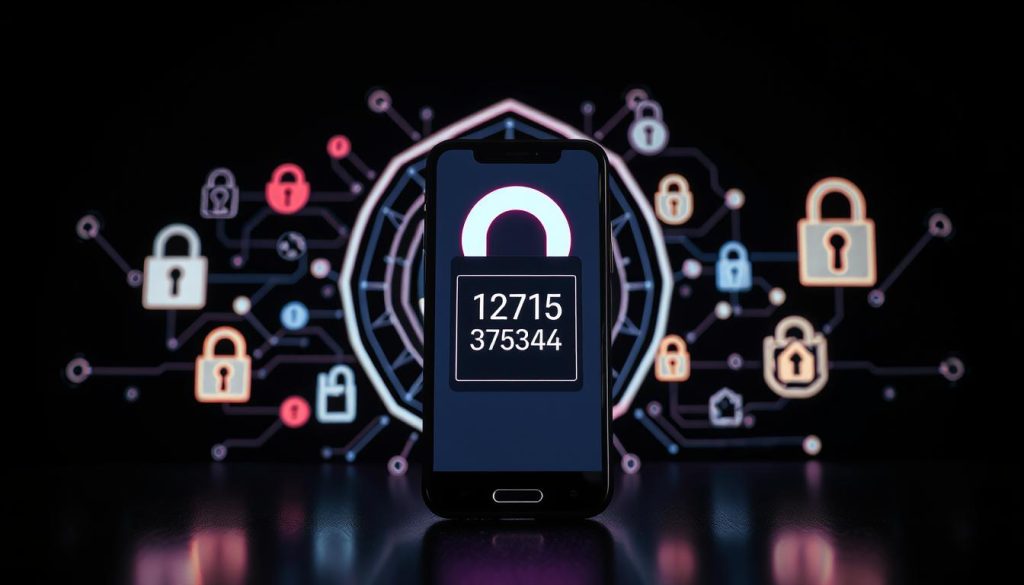
Ever got a text saying it’s from Canada Post and wondered if it’s real? Digital scams are getting smarter. It’s key to know if Canada Post SMS is real.
Every year, many Canadians get tricked by fake text messages. These scams look very real. It’s hard to tell the real messages from the fake ones.
This guide will teach you how to spot real Canada Post texts. You’ll learn how to keep your info safe. Knowing the real messages helps you stay safe online.
Key Takeaways
- Learn to identify authentic Canada Post text messages
- Recognize common signs of text message scams
- Understand official communication channels
- Develop skills to verify message legitimacy
- Implement protective strategies against digital fraud
Understanding Canada Post Communication Methods
It can be hard to know if a message is real or a scam from Canada Post. They use many ways to talk to customers. It’s important to know how they really communicate.
Knowing how Canada Post talks to you helps spot scams. Scammers try to look real by using trusted ways to send messages. Being aware is your best defense.
Primary Communication Channels
- Text message notifications
- Official email communications
- Physical mail delivery notices
- Website tracking updates
- Mobile app notifications
Official Communication Verification
Always check if a message is real. Real messages from Canada Post will:
- Have recognized phone numbers
- Give clear tracking info
- Never ask for personal details
- Use professional language
| Communication Type | Verification Method |
|---|---|
| Text Messages | Check Canada Post website or call customer service |
| Email Notifications | Verify sender email address matches official domain |
| Tracking Updates | Cross-reference with official tracking number |
Knowing these ways helps you safely talk to Canada Post. It also helps you spot scams.
Recognizing Legitimate Canada Post Text Messages
It’s important to know what real Canada Post texts look like. Scammers try to trick you, so it’s key to spot fake messages. This helps keep you safe online.
Canada Post texts have special signs that show they’re real. Knowing these signs helps you tell real messages from fake ones.
Key Features of Authentic Texts
Real Canada Post texts have:
- An official sender ID with Canada Post branding
- Tracking numbers or package info
- Clear, professional language
- Links only to official canada post domains
Example Message Characteristics
Real Canada Post messages are clear and give specific details. Here’s what you should see:
| Message Element | Authentic Characteristics |
|---|---|
| Sender Information | Comes from official Canada Post contact numbers |
| Content Style | Professional, straightforward delivery notifications |
| Links | Direct to canadapost.ca domain only |
Pro tip: Always check suspicious messages on the official Canada Post website or customer service line.
Red Flags to Look Out For
Spotting fake Canada Post delivery texts needs careful attention. Scammers use smart tricks to fool people. This makes checking if a message is real very important.
- Generic or missing personal greeting
- Poorly written text with many grammatical errors
- Unusual or unfamiliar sender phone numbers
- Urgent language demanding immediate action
Unusual Sender Information
Real Canada Post messages come from official places. Be wary of texts that:
- Use non-official phone numbers
- Display incomplete or inconsistent sender information
- Contain random characters or strange email addresses
Requests for Personal Information
A big warning sign is when messages ask for personal info. Real Canada Post people will never ask for:
- Social Security numbers
- Credit card details
- Complete banking information
- Password or login credentials
Keeping your personal info safe is key. If you’re unsure, call Canada Post directly. You can reach them on their official website or customer service line.
How to Verify a Canada Post Text
It’s important to know how to check if a Canada Post text is real. This can help you avoid scams. Learning how to check Canada Post text messages can keep you safe.

Using the Canada Post Website
Start by using these official ways to check:
- Go to the Canada Post tracking page
- Put your tracking number on the website
- Look at the delivery info and compare it to the text
- See if the tracking status and delivery date match
Contacting Customer Service
If you’re not sure, call Canada Post’s customer service:
- Call the Canada Post customer support number
- Tell them your tracking number from the text
- Ask if the message is real
- Don’t give out personal financial info
Real Canada Post messages won’t ask for your personal info. Always check things out through official ways if you’re unsure.
Tips for Protecting Yourself from Scams
Keeping your personal info safe is key when facing Canada Post scam messages. Cybercriminals get better at finding and tricking people. They use phishing to get what they want.
To spot Canada Post phishing texts, you must stay alert. Here are ways to keep your info safe:
- Never give out your Social Insurance Number (SIN) unless it’s to:
- Verified employers after they hire you
- Government programs like Employment Insurance
- Canada Revenue Agency
- Real financial institutions
- Be careful of messages asking for personal stuff
- Check who sent the message before you reply
Recognizing Phishing Red Flags
Scammers try to scare you into giving them info. Look out for these signs in Canada Post scam messages:
- Unexpected requests for personal information
- Messages with spelling and grammar mistakes
- Links that don’t look like Canada Post’s
- Threats of account shutdown or legal trouble
Protecting Your Digital Footprint
Use strong digital security to avoid phishing. Make sure your passwords are unique. Turn on two-factor authentication and keep your devices updated.
The Role of Two-Factor Authentication
Keeping your online accounts safe is more than just a strong password. Two-factor authentication (2FA) adds a vital extra layer of security. It helps protect your Canada post text notifications and digital communications.

2FA is like a digital bodyguard for your personal info. When you turn it on, you need two steps to get into your account. This makes it really hard for scammers to get in.
Understanding Two-Factor Authentication Options
Canada Post text message verification has many ways to keep your account safe:
- SMS code verification
- Authenticator app integration
- Email confirmation links
- Biometric verification
Setting Up Two-Factor Authentication
To turn on 2FA for your Canada Post account, just follow these easy steps:
- Log into your official Canada Post account
- Navigate to account security settings
- Select two-factor authentication option
- Choose your preferred verification method
- Confirm and save your settings
Using two-factor authentication greatly lowers the chance of someone getting into your account without permission. It also helps stop scams from getting to your personal info.
| Authentication Method | Security Level | Convenience |
|---|---|---|
| SMS Verification | Medium | High |
| Authenticator App | High | Medium |
| Biometric | Very High | Low |
Spending a few minutes to set up 2FA can save you a lot of trouble and money later.
Reporting Suspicious Messages
It’s hard to spot fake Canada Post delivery texts. But knowing how to report them is key to keeping safe. If you see a suspicious message, act fast. This helps stop scams and keeps everyone safer online.
Knowing if a Canada Post text is real means watching for red flags. Scammers make messages look real at first. So, it’s important to report them right away.
Steps to Report Suspicious Messages
- Capture a screenshot of the suspicious text message
- Do not click on any links or respond to the message
- Contact Canada Post customer service directly
- Report the incident to the Canadian Anti-Fraud Centre
Reporting Channels
| Reporting Method | Contact Information | Recommended For |
|---|---|---|
| Canada Post Customer Service | 1-866-607-6301 | Direct delivery-related concerns |
| Canadian Anti-Fraud Centre | 1-888-495-8501 | Formal scam reporting |
| Online Reporting | www.antifraudcentre-centreantifraude.ca | Detailed scam documentation |
Your watchfulness can stop scams and keep you and others safe. It’s a big help.
Reporting scams is a big deal. It helps stop fraud and keeps Canada Post customers safe. Every report is important in the fight against online scams.
Resources for More Information
It’s important to know about scams to keep yourself safe. Knowing how to check if a Canada Post SMS is real is key. This helps you understand if a delivery notice is okay.
Official Canada Post Online Resources
- Go to the Canada Post official website for the latest on security
- Look at their fraud prevention section
- Read their tips on how to communicate safely
Government Scam Awareness Platforms
Use these government sites to check if a Canada Post notice is real:
- The Canadian Anti-Fraud Centre (CAFC) website
- The Royal Canadian Mounted Police (RCMP) scam reporting portal online
- The Competition Bureau of Canada’s fraud awareness page
Additional Support Channels
If you get a weird message, reach out to these places:
- Canada Post Customer Service: 1-866-495-6371
- The Canadian Anti-Fraud Centre hotline: 1-888-495-8501
Being careful and informed is the best way to avoid scams. This is true for Canada Post customers.
Staying Informed About Current Scams
Keeping safe from Canada Post scam messages means always being alert. Cybercriminals keep finding new ways to trick people. So, it’s key to know about the newest scams.
To spot Canada Post phishing, you must follow many sources. Also, always be ready to protect your online safety.
Official Announcement Channels
Canada Post has many ways to keep you updated on scams:
- Official website security updates
- Social media security alerts
- Customer email notifications
Community Alert Systems
Local groups help spread the word about new scams. Here’s how to get involved:
- Join local cybersecurity forums
- Subscribe to regional consumer protection groups
- Follow trusted online security platforms
| Information Source | Reliability Rating | Focus Area |
|---|---|---|
| Canada Post Website | High | Official Scam Alerts |
| Canadian Anti-Fraud Centre | Very High | Comprehensive Scam Intelligence |
| Consumer Protection Networks | Medium | Community-Shared Experiences |
Being proactive and connected helps a lot. Remember, knowing is your strongest shield against online scams.
Educating Friends and Family
It’s important to protect yourself from scams. But, teaching others about real Canada post texts can help everyone. Scammers keep getting smarter, so knowing about scams is key.
Talk to your friends and family about spotting fake Canada post texts. Teach them how to spot dangers.
Effective Ways to Share Scam Awareness
- Host informal family discussions about recent scam trends
- Share real-world examples of fraudulent text messages
- Demonstrate how to verify official Canada Post communications
- Encourage open dialogue about suspicious interactions
Conversation Strategies for Scam Prevention
Be kind and understanding when talking about scams. People are more likely to listen and learn when they feel respected. Tell them even smart people can get tricked by scams.
Start a family chat or email for scam alerts. This keeps everyone safe and informed.
Personal Experience Sharing
Telling your own scam story can really help. If you’ve seen a scam, explain how you checked it. This teaches others how to be safe.
Keep learning about new scams. Always talk about staying safe online.
Conclusion and Final Thoughts
Keeping safe from scams means always being careful. Learning to spot real Canada Post texts is key. It helps keep your digital world safe.
Knowing what real messages look like makes you feel more secure online. This guide teaches you to spot fake messages. Scammers change their tricks often, so you must stay alert.
Being careful is very important. If a message seems wrong, don’t ignore it. Always check with Canada Post before acting. Tell your friends and family about these tips to help everyone stay safe.
Staying safe online is a never-ending job. Keep learning about new scams. Always be a little suspicious of messages you get. Your smart thinking and quick actions can keep your info safe.